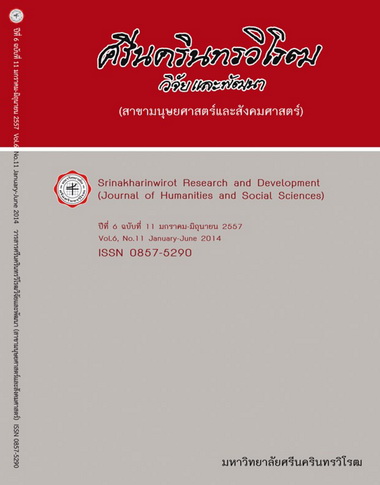A STUDY ON A CALCULATION SKILL – ADDITION – AND HAPPINESS OF PRATHOMSUKSA FOUR STUDENTS WITH DIFFERENT INTELLIGENCE QUOTIENT USING MATHEMATICS GAMES AND EXERCISES
Keywords:
Calculation skill – addition, Happiness, Different intelligence quotientAbstract
The purpose of this research was to compare a calculation skill - addition - and happiness of Prathomsuksa 4 students with different intelligence quotient, using mathematics games and exercises. The sample group consisted of 60 Prathomsuksa 4 students at Suphanburipanyanukul school. Drawn by lots, it was divided into two experimental groups containing 30 students each. The first one was taught by mathematics games for 20 hours, while the latter by exercises with the same duration. The research instruments included a set of lesson plans using mathematics games, a set of lesson plans using exercises, a calculation skill test, and a happiness observation form. The research design was pretest - posttest with nonequivalent groups. Statistical analysis was performed in terms of Welch - ANOVA and Two- way ANCOVA.
The results of this study revealed as follows:
1. The calculation skill on the lesson of Addition of the students with different intelligence quotient taught by mathematics games and exercises was not different. In other words, The calculation skill of those taught by games and that of the group taught by exercises was not different. However, The calculation skill of the students with an IQ. of 50-70 and that of the students with an IQ. of 35-49 was different with a statistically significant level of 0.05.
2. Happiness caused by studying mathematics of the students with different intelligence quotient taught by mathematics games was different with a statistically significant level of 0.05. However, happiness found after studying mathematics of the students taught by exercises was not different. Nevertheless, happiness found in the group with an IQ. of 50-70 and that of the group with an IQ. of 35-49 who studied mathematics using games and exercises was different with a statistically significant level of 0.05. Happiness found in the group taught by games was higher than the other group by exercises.
Downloads
Downloads
Published
How to Cite
Issue
Section
License
Srinakharinwirot Research and Development Journal of Humanities and Social Sciences is licensed Under a Creative Commons Attribution-NonCommercial-NoDerivs 4.0 International (CC-BY-NC-ND 4.0) License, Unless Otherwise Stated. Please Read Journal Policies Page for More Information on Open Access, Copyright and Permissions.



